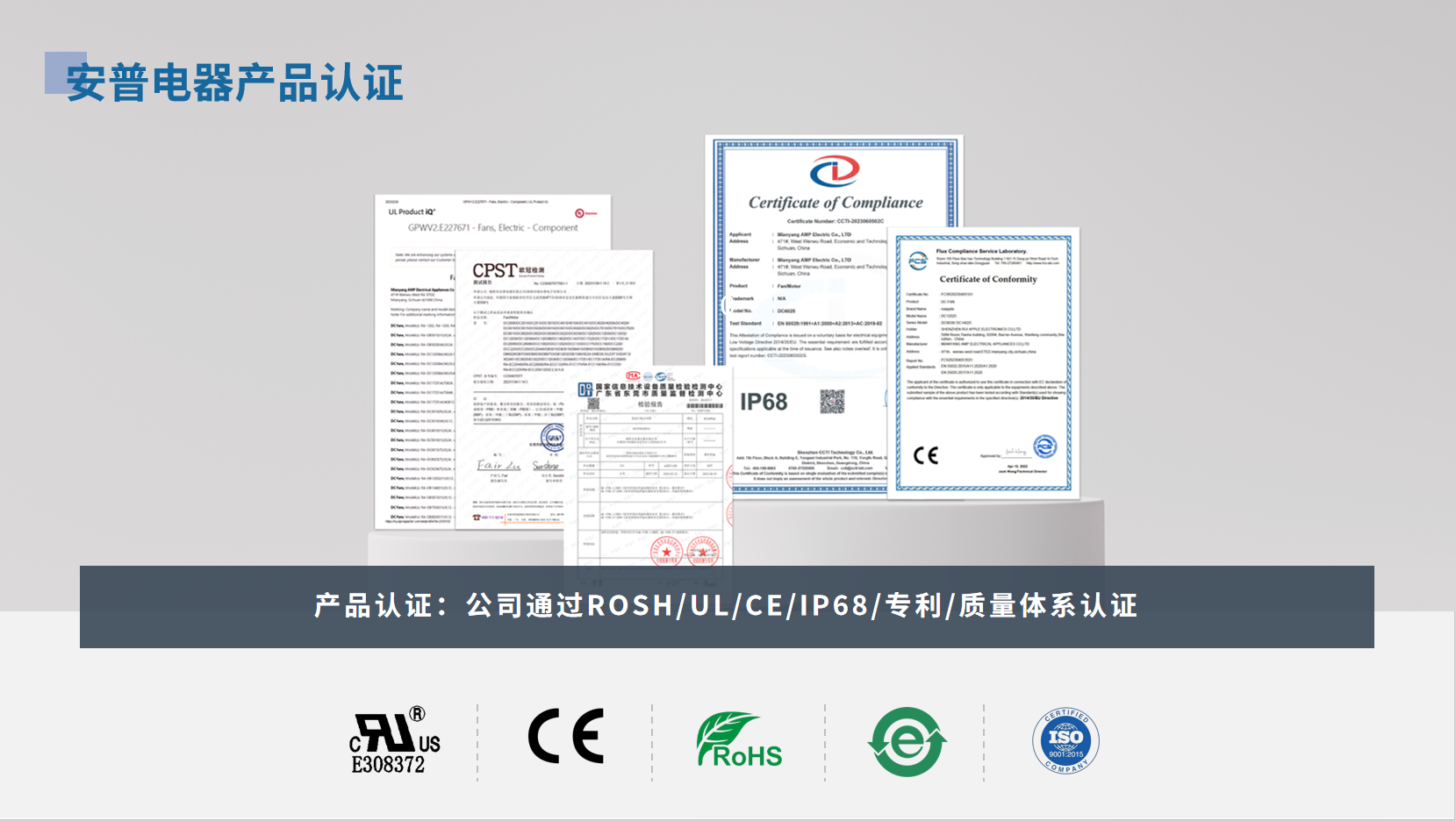Cooling fans are a crucial component of electronic devices, and their safety performance is vital to the overall reliable operation of the equipment. Different countries and regions have strict safety requirements for cooling fans, including various certification standards. This article will provide a detailed overview of the most common safety certifications for cooling fans worldwide, helping you understand their significance and scope.

- Why Do Cooling Fans Need Safety Certifications?As essential electrical components, cooling fans may involve high voltages, heat generation, and electromagnetic interference. Without proper safety certifications, their use could pose safety risks, affecting both users and devices. Cooling fans that meet safety certifications ensure that their design, materials, and manufacturing processes align with international and regional standards, enhancing product credibility and market acceptance.
- Common Safety Certifications and Their Application RegionsHere are some of the most common safety certifications for cooling fans and their key characteristics:
UL Certification (United States)
- Applicable Standards: UL1950, UL60950 (Information Technology Equipment)
- Key Features: UL certification is one of the most authoritative safety certifications in the United States, focusing on fire resistance, electrical safety, and mechanical safety. UL-certified products meet the sales requirements for the U.S. market and enhance brand reputation.
TÜV Certification (Germany)
- Applicable Standards: IEC60950, EN60950 (Information Technology Equipment Safety)
- Key Features: TÜV certification emphasizes product safety and environmental performance. It holds high credibility in Germany and other European countries, serving as a key entry point into the European Union market.
3C Certification (China)
- Scope: AC fans (mandatory), DC fans (currently no mandatory requirements)
- Key Features: China’s mandatory product certification system requires AC fans sold domestically to meet the 3C certification standard, ensuring consumer safety.
CE Certification (European Union)
- Applicable Standards: LVD (Low Voltage Directive), EMC (Electromagnetic Compatibility Directive)
- Key Features: CE certification is a market access certification for the European Union, requiring products to meet strict safety and electromagnetic compatibility standards while also complying with environmental and consumer protection regulations.
Other Important Safety Certifications
CB Certification (International)
- Applicable Standards: IEC system-based universal certification
- Key Features: CB certification, managed by the International Electrotechnical Commission (IEC), simplifies the certification process across countries and facilitates faster market entry.
PSE Certification (Japan)
- Scope: Electrical safety for relevant products
- Key Features: PSE certification is required by Japan’s Electrical Appliance and Material Safety Law, emphasizing the safety of products used in the Japanese market.
RoHS Certification (European Union)
- Scope: Restriction of Hazardous Substances Directive
- Key Features: Although RoHS is not a safety certification, it is related to safety by ensuring that products do not contain harmful substances that could pose risks to human health or the environment, complying with EU environmental standards.
VDE Certification (Germany)
- Scope: Various electronic and electrical products
- Key Features: VDE certification holds significant authority in Germany, focusing on electrical safety and product lifespan. It is particularly suitable for markets with strict quality requirements.
Importance of Safety Certifications
- Ensuring Safety: Safety certifications verify a product’s performance under extreme conditions, ensuring the safety of both the device and its users.
- Enhancing Market Competitiveness: Products with internationally recognized safety certifications are more easily accepted in target markets, increasing competitiveness.
- Building Brand Image: Certification not only signifies high product quality but also demonstrates the company’s commitment to safety and environmental responsibility.
- How to Choose a Certified Cooling Fan?When selecting the appropriate cooling fan, consider the following:
- Ensure the product meets the safety certification requirements of the target market.
- Check for additional certifications, such as environmental certifications (RoHS, REACH, etc.).
- Choose products from reputable manufacturers, such as Ruiapple Electric, whose cooling fans are certified with multiple international standards, ensuring high efficiency, safety, and reliability.
- Learn More About Safety CertificationsFor more information on cooling fan safety certifications, visit Ruiapple Electric’s website. We provide comprehensive product solutions and technical support to ensure your application needs are fully met. With strict safety certifications, Ruiapple Electric’s cooling fans not only meet international standards but also demonstrate exceptional quality and brand value.






